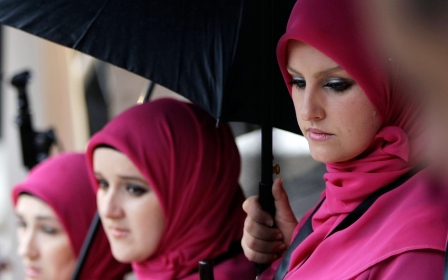Turkey plans new wedding law: Will it end happily ever after?

The Turkish government has announced its intention to propose a draft law that would grant muftis the right to register marriage contracts, a privilege that has so far been restricted to authorised municipality officials.
A mufti is a scholar who specialises in Islamic jurisprudence and is qualified to issue a fatwa (religious edict) in accordance with the system of the religious affairs department, which is responsible for matters relating to Islam, the faith embraced by the majority of Turks.
Turkish marriage registration has, since the 1920s, been based on a peculiar secularist system
In contrast, the municipal marriage registrar is a civil servant who needs knowledge of the law but not of Islamic jurisprudence.
It would seem, at first, that such a plan should not arouse much concern. Whether it is the mufti or the civil servant who registers the contract, what eventually matters is that it is legal and entered in state records, providing the two parties with the protection they expect should the need arise.
But this is not how things work in Turkey. This is a state that has, since the 1920s, been based on a peculiar secularist system.
Marriage in the Islamic tradition: A civil affair
The republican state not only integrated the country’s judiciary into the umbrella of the civil court system, but went further and annulled the Islamic judiciary and stripped the scholars’ institution of all legal powers.
This is why the new draft law is drawing so much controversy and stirring up debate about the different concepts of secularism and about how to reconcile the secularist system with people’s faiths and inherited traditions.
Additionally, it is argued, giving muftis the power to register marriage contracts may threaten some of the legal conditions stipulated by the state to issue a marriage licence, such as the legal age, especially for girls, who in some conservative Turkish regions can be married before this is attained.
In other words, opponents are deeply sceptical about the loyalty of Muslim scholars to Turkish state legislation and believe that these scholars have greater readiness to ignore some of the legislation. The administration of personal affairs in particular used to be monopolised by the scholars’ establishment before the birth of the republic and prior to the adoption of the secular system.
The administration of personal affairs in particular used to be monopolised by the scholars’ establishment before the birth of the republic and prior to the adoption of the secular system
What the supporters and the opponents of the new draft law both seem both to ignore is that marriage in the Islamic tradition is a civil affair and therefore does not require the blessings of a religious institution in order to be completed.
The fact that marriage contracts may, at times, be informed by a certain school of jurisprudence does not mean that the marriage contract cannot be legitimate unless concluded in the presence of a clergyman and unless blessed by a certain religious establishment. In essence, the marriage contract is just like any other contract and may even be concluded without registration.
This was the normal practice during the early centuries of Islamic history, when there were no state papers and no state records. These instruments came into existence as state institutions developed and with the purpose of providing better guarantees for the rights of contracting parties.
What will change?
In the Ottoman system, which formulated the culture and traditions of oriental Islamic societies for hundreds of years, there was no religious civil legal dualism, not even during the era of Ottoman Tanzimat or what is known as the start of modernisation in the 19th century.
However, as of the beginning of the second half of the 19th century, civil courts were born and tasked with administering a tangible sector of transactions. In the meantime, personal affairs, including matters relating to marriage, divorce and inheritance, remained within the mandate of the Islamic judiciary and were attended to by judges who acquired an education in Islamic jurisprudence.
The Republican state then annulled the Islamic judiciary in its entirety and decided that only legislation decreed by the state constituted a frame of reference for the judiciary. Instead of the department of Shaykh-ul Islam, which enjoyed significant powers and continued to do so for some time even in the wake of Ottoman modernisation, the Republican state established the Religious Affairs Department, which was linked directly to the prime minister’s office.
The Religious Affairs Department manages the affairs of mosques, supervise them and appoints muftis to whom individuals may resort for counsel, should they need to.
Certainly, the Republican state was not the first to exclude scholars from the task of concluding marriage contracts. Historians of the late Ottoman state know that as soon as the system of municipalities was born during the 1860s, the Ottoman authorities announced that registering marriage contracts had become the prerogative of the municipality and not the Islamic judiciary.
However, the bulk of Muslims, who were accustomed to concluding marriage in the presence of a judge, would generally go to the municipality first in order to register the marriage in compliance with the orders of the modern state. Then it would pass by the judge’s office to ratify the contract, thinking that legitimacy and divine providence could only be acquired through the blessings of the judge.
Should the controversial bill be passed, not much will change in reality
Even after the annulment of the Islamic judiciary by the Republican state, many Turks, especially in the cities and towns of conservative Anatolia, continued to adhere to the belief that acquiring legitimacy for the contract and gaining divine providence was conditional upon ratification from the judge.
But since the Islamic judiciary no longer existed, Turks started going to muftis in order to obtain the ratification of marriage contracts after registering them with the civil authorities. In other words, the duality of marriage contract registration did not end, even 90 years after the Republican state established its authority. For some reason, state power and laws could not end customs nor obliterate them.
This does not mean that they were more than just customs. After all, marriage contract legitimacy is effectively established, even from a pure Islamic view point, irrespective of whether the person who undertakes the process of registration is a civil servant or a religious affairs department mufti.
Should the controversial bill be passed, not much will change in reality. What will change is that people will be given the freedom to choose between registering at the mufti’s office in the Religious Affairs Department or at the municipality with the civil servant charged with this task. In either case, the contract will be considered legitimate and only the relevant state authorities will undertake to keep the contract in their records and then make it available to the concerned parties when needed.
Secular models: US and UK vs. France
Two models exist for dealing with marriage in the Western secular state, from where the secularist system originated.
The first model exists in the UK and US, where church marriage and civil marriage are both permitted. Certain priests enjoy the authority to register marriage contracts in much the same way as civil registrars do.
The second model exists in France where a church marriage is not permitted and where a marriage contract is not deemed legitimate unless conducted by an authorised civil registrar. The UK and US secularism was born, and is understood, differently from French secularism.
Two models exist for dealing with marriage in the Western secular state, from where the secularist system originated
The UK and US model may be described as one that is closer to state neutrality. In contrast, the French secularist model sees the state deeply involved and increasingly ambitious to control, even marginalise the religious legacy.
However, what really matters is that allowing church marriages and granting priests the authority to register marriage contracts has not undermined UK nor US secularism. Nor did either country revert to the era of church hegemony or the supremacy of the religious institution over the state.
What the UK and US system has led to is bolstering the values of freedom and respect for the personal beliefs of individuals. This, somehow, is the choice given to the Turks by the proposed new draft law about the registration of marriage contracts.
- Basheer Nafi is a senior research fellow at the Al Jazeera Centre for Studies.
The views expressed in this article belong to the author and do not necessarily reflect the editorial policy of Middle East Eye.
Photo: A newly married couple poses for wedding pictures in front of the Maiden's Tower in August 2013 in Istanbul (AFP
Middle East Eye propose une couverture et une analyse indépendantes et incomparables du Moyen-Orient, de l’Afrique du Nord et d’autres régions du monde. Pour en savoir plus sur la reprise de ce contenu et les frais qui s’appliquent, veuillez remplir ce formulaire [en anglais]. Pour en savoir plus sur MEE, cliquez ici [en anglais].







